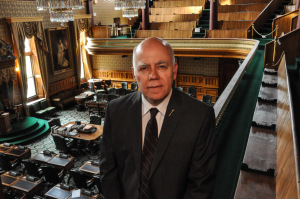Concentration of Power Makes for Bad Government, says MLA
article by John Chillibeck, Telegraph Journal
 FREDERICTON • A huge budget jump in the provincial cabinet office – to $17 million from $5.5 million over a decade – is proof of the concentration of power at the top, says an opposition MLA.
FREDERICTON • A huge budget jump in the provincial cabinet office – to $17 million from $5.5 million over a decade – is proof of the concentration of power at the top, says an opposition MLA.
David Coon, the Green MLA for Fredericton South, says the transfer of many top-earning civil servants to the executive council office in 2012-13 during David Alward’s Progressive Conservative government shows how the most important decisions are increasingly being made by political types rather than experts in government departments.
“The public service has just been told what to do and their professional expertise as public servants with special knowledge, background and experience is not being used to help ensure we have the best possible public policies,” he said in an interview Wednesday. “Instead of senior civil servants providing policy options to their ministers to take forward, we’re getting deputy ministers telling departments what to do based on what comes out of the centre of government.”
Coon brought up the issue Wednesday afternoon while questioning Judy Wagner, the deputy minister of the executive council office, who appeared at the standing committee on public accounts.
The MLA pointed out the number of employees who made more than $60,000 increased fourfold in her office in 2012-13.
While overall in government it was a time of restraint and many positions were being eliminated through attrition, the executive council office went from having 18 employees in the top salary range to more than 80 in one year. They were positions largely transferred from other government departments.
“The principles of good management would indicate that there would be one boss and one manager, and that’s the way it should run, but certainly, we have complexities in the ECO,” said Wagner, referring to her office.
The deputy minister, or secretary to cabinet as she’s often described, said a number of responsibilities, such as trade, had been transferred to assistant deputy ministers in her office. These senior civil servants then report to the cabinet minister responsible. In the case of trade, it would be Rick Doucet, who is also in charge of Opportunities New Brunswick and Agriculture, Aquaculture and Fisheries.
The reorganization, she said, was made to help carry out the strategic goals of the elected government.
Coon asked if this meant the roles of cabinet ministers had changed, with the executive council taking over their responsibilities.
Wagner said no, that it simply formalized the way the bureaucracy had always worked.
“It didn’t change the roles of cabinet ministers and the responsibilities they carried in respect to their portfolios. It’s a co-ordination function and communication function with the deputy ministers as they carry out their work in support of the strategy.”
Coon, however, describes it as part of an ominous trend in Canadian government that has seen cabinet ministers lose power to the leader and his entourage – in this case the premier, whose political staff works closely with the executive council office.
“We’ve seen this happen in New Brunswick since the McKenna government in the 1980s,” Coon said afterwards. “It’s also happened in Ottawa, which really began during the Pierre Elliott Trudeau era.”
The MLA believes this concentration of power is a big mistake because it creates a one-way flow on policy direction – from the political higher-ups down to civil servants – rather than a two-way flow, with civil servants giving expert advice on how political leaders can best obtain their objectives.
“The whole process for decision-making and direction is much more complicated now and much more controlled in the centre of government,” Coon said. “Deputy ministers are more tightly connected to the executive council office than their own ministers.”